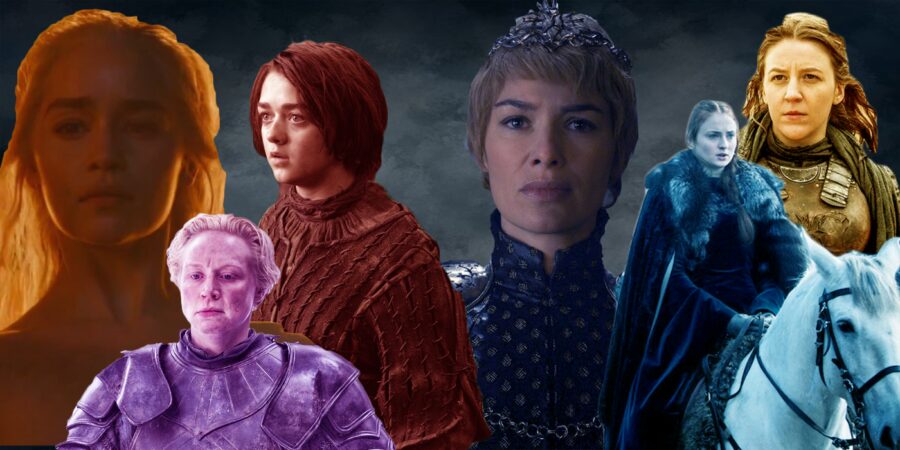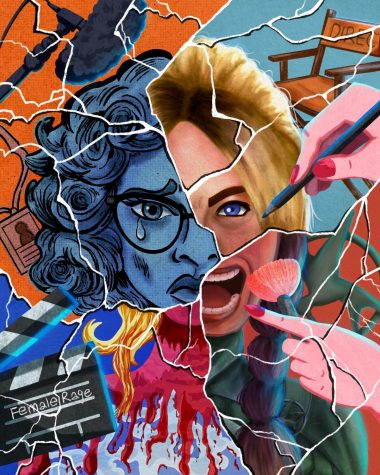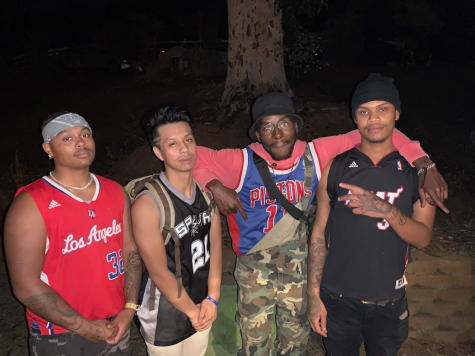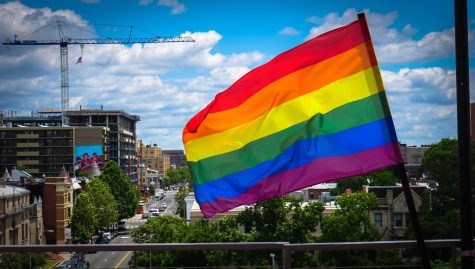“All men must die, but we are not men.”
A look at the significant portrayal of female characters in Game of Thrones
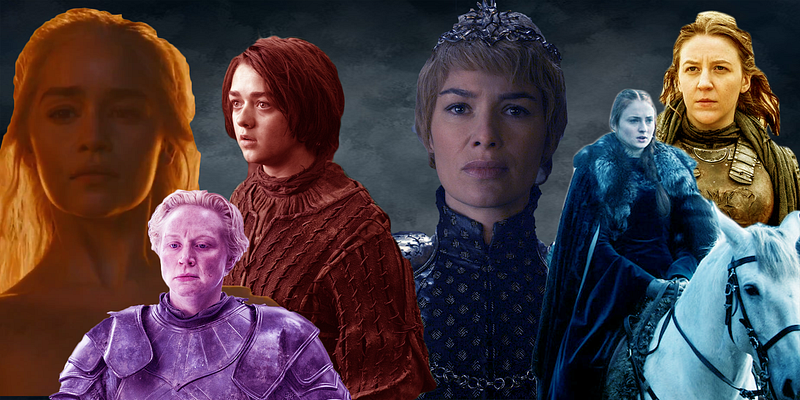
“All men must die, but we are not men.”
A look at the significant portrayal of female characters in Game of Thrones
Brace yourself, spoilers are coming.
To the naked eye, Game of Thrones might seem like just another HBO fantasy series with fire-breathing dragons, hundreds of sex scenes and heartbreaking character deaths, but the people of the Game of Thrones universe deal with much more than that — especially the women. They’re either raped, murdered or forced to shed some aspect of their femininity in order to survive.
In a panel at South By Southwest, in Austin, Texas., D.B. Weiss, one of the show’s co-creators, reaffirmed that the women in this show are just as important as the men, even though it’s set in a time period where patriarchy is prevalent. “We realized it’s an awful world where this story takes place, but there were compelling, female characters who had agency. They weren’t secondary to anybody — they had their own storylines,” Weiss said.
This was seen in the show’s sixth season where the women have finally taken over their storylines, an example being Cersei Lannister’s heartbreaking claim to the throne.

Usually seen with a goblet of wine, Cersei Lanniser is our unlikely and accidental feminist. I know what you’re thinking: Cersei? The stone-cold Queen who basically was the cause of Ned Stark and 60% of the shows deaths? Let me just shine some light on this subject.
After being married off to the late-King Robert Baratheon, many would’ve expected Cersei to be complacent while Robert drank and slept his way through Westeros, but she had her own agenda all along. She raised her children, who belonged to her twin brother Jaime — yep, incest is also in the show — as her own and has a strong sense of maternalism that is one of the highlights of her character.
Undoubtedly, her life would have been different if she was born with a penis and not a vagina. She wouldn’t had to have married Robert Baratheon, because she would have been heir to Casterly Rock. Her father, the late-Tywin Lannister, trusted her the most out of his three children, but due to her gender, she had to work harder for things that unqualified men were just given. Sounds a lot like the 2016 presidential election, right?
Because she is a female, she dealt with sexism and misogyny through her whole life, but one of the biggest moments was her walk of atonement, which happened in season five.
For those who have never seen GoT, they basically shaved her head, made her strip down and presented her to the people of Kings Landing as a sinner. She was forced to walk through the slums as disgusted onlookers spit on her, shouted slurs and threw trash at her. Mind you, this was all happening as she was followed by Septa Unella, a nun-like Silent Sister, who was ringing a handbell and saying, “Shame!,” over and over again.
She doesn’t let anyone see her weak or vulnerable after the incident and goes back to the stone-cold monarch that we’ve learned to love. It didn’t break her, because she had much more to worry about — like the fate of her last child. She’s dehumanized to the worst extent, but bounces back like the Big Sean song.
One of the best, and my favorite, Cersei one-liners is what she says after her cousin, a member of the Faith Militant, informs her that the High Sparrow requests to see her at the Sept of Baelor. The cousin, who I randomly met at a house party in The Valley, demands for Cersei to ask her bodyguard, Ser Gregor Clegane AKA The Mountain, to step aside or there will be violence. Cersei’s badass says, “I choose violence,” and watches the Mountain rip a mans head off and tosses it aside.
In the finale of season six, Cersei assumes the throne as “Cersei of the House Lannister, the First of Her Name, Queen of the Andals and the First Men, Protector of the Seven Kingdoms,” something that you’d think would be celebrated, but was actually mourned for the golden-haired queen.
Her ascension to the throne was due to the fact that her third and youngest child, King Tommen, jumped off a tower and committed suicide after finding out that his wife, Margaery Tyrell, was murdered in an event that was orchestrated by his mother, otherwise known as destruction of the Great Sept of Baelor.
If there is one thing that anyone who has seen an episode of GoT knows, it’s that Cersei would do anything for her children, who are all dead. Throw in a cryptic prophecy about how she marries the king instead of the prince, bears three children who will all die and then will die at the hands of her “Valonqar,” or little brother, and you can understand why Cersei is shook.
In an interview with The Wrap, Lena Headey, who plays Cersei shares her thoughts on Cersei’s mental state and whether or not she believes her character is a feminist. Headey said that after the death of her children, she has nothing to lose at this point. Like Cersei once said to Petyr “Littlefinger” Baelish, “power is power.”
With regard to Cersei as a feminist, Headey said, “Obviously that’s not her motivation, but yes. It’s sad she never got to raise her daughter, we would’ve seen a great parent. Feminist, yes — early stages.”
Violence is an obvious and constant theme in this show. There are rebellions, battles, beheadings and every other gruesome event that has made every GoT viewer numb to the sight of blood and gore. The women stay at home, while the men fight and all that medieval bullshit, however there are a few women who don’t mind getting their hands dirty.

Brienne of Tarth is one of those characters. When we first meet Brienne, it’s assumed that she is a man due to her height, strong physique and that she’s a skilled fighter. As a gender non-conforming character, Brienne doesn’t try to be a male, but has masculine traits and is often mistaken for a man, due to her participation in men’s activities.
Brienne is a loyal character as well. Currently, she’s vowed her loyalty to Sansa Stark and has pledged to protect her no matter what, just as she did with her mother, Catelyn Stark. Brienne is the only character, other than the Mountain (Cersei’s bodyguard), who has defeated the Hound. Note: the Mountain and the Hound are brothers, so this is a big deal.
The actress behind Brienne of Tarth, Gwendoline Christie, said that Brienne is perfect for her since she is so outside the traditional convention of female characters.
“I love that she’s focused her power into physical strength. She looks so very different from the other female characters in Game of Thrones. But what’s so beautiful about the writing is you see not just a female who’s physically strong but, over time, especially in the season to come, a 360-degree view of who this person is. You see her strength, and her frailty. What we see is a burgeoning search for what it is to be a woman. Strength doesn‘t have to come from assuming male attributes … A woman can have a bond with a man that isn’t,” Christie said.
In regards to the show as a whole, Christie said “It shows both the dark side and the bright side of humanity. It’s inclusive. It’s not just ‘the strong man’ and ‘the dutiful wife’ or ‘the hostage.’ The woman in the show is fucking dangerous, and has to be watched. As in real life.”
One more thing about Brienne is that she’s one of the only people, and only woman, to be carrying a Valyrian steel sword. The way she got it is even more impressive. Jaime Lannister, the one-handed “Kingslayer,” gifted it to her, in order to protect Ned Stark’s daughter, Sansa, with Ned Stark’s blade. She decided to name it, “Oathkeeper.” Jaime giving the sword to Brienne is huge and made all of Jamie/Brienne shippers cry.
Repeat after me: Brienne of Tarth is a feminist icon.

Another gender non-conforming character we just met in season six is Yara Greyjoy, sister to Theon Greyjoy, AKA the guy who got tortured and castrated. Yara is a warrior. She’s a tough bitch. Plus, she’s from the Iron Islands, where people are hardened, callous, and rough.
Yara and Theon’s relationship is a broken one, but the two are blood in the end and we see their bond grow stronger. After returning to the Iron Islands, Theon realizes no one is better to sit on the Salt Throne than his sister.
“And she is your rightful ruler. Those of you that have sailed under her, and there are many of you here, you know what she is! She is a reaver! She is a warrior! She is Ironborn! We will find no better leader! This is our queen!,” said Theon Greyjoy, brother of Yara Greyjoy.
This is a change in what we’ve seen in GoT. A male giving up his title, so qualified female could have it. After Theon’s journey, this was the best call he could have made.
Things go south for Yara when she loses the Kingsmoot (the king election) and has to escape the Iron Islands with her brother and a fleet of ships — they have a crazy uncle who wants them dead — but in the scene following that, we learn that Yara is queer.
Don’t get me wrong, you see a lot of homosexual and bisexual activity in this show — literally the first episode — but it’s usually women having queer sex to please men in brothels. There were storylines about gay, bisexual and pansexual characters though. If you can think back a few seasons, Loras Tyrell and Renly Baratheon were in a secret gay relationship and Oberyn Martell just did not give a shit.
There is speculation and controversy surrounding whether or not she is explicitly lesbian. However, Yara did say she was “up for anything,” while having a conversation with Daenerys about working together to get to the Iron Throne.
Emilia Clarke, who plays Daenerys Targaryen, said “There’s mild flirtation, which is exciting to say the least. I mean get rid of Daario and bring on the ladies. Why not?” Anything really goes in this show, so hopefully season seven gives us some more Yara/Dany flirtations.
Going back to Yara and Theon in the brothel — Yara shows tough love to her PTSD-ridden brother and reminds him who they are and where they come from. She feels how uncomfortable he is by all the naked women walking around, especially after his castration, and tells him, “Listen to me. If you’re so broken that there’s no coming back, take a knife and cut your wrists. End it.” The typical gender roles are reversed in this situation and for once, a male is subservient to a female and Theon agrees to stand with his sister.
Gender roles have been implemented for years, in real life and in fictional universes. Girls wear pink and boys wear blue. Girls learn how to be princesses, while boys learn how to fight. Arya Stark is a different story. She’s interested in archery and swordsplay.

From the pilot episode of the series, it’s always been apparent that Arya was a self-proclaimed “tomboy.” She didn’t follow the notion that she had to become a lady and use marriage as a form of gaining power and uniting houses. Arya was an outcast, just like her half-brother Jon Snow, who encouraged her fascination in warfare and training. She names the sword he gives her, “needle,” as a play on words on how she refused to learn how to sew.
After watching her fathers beheading, Arya was taken into protection by a member of the Night’s Watch so she could escape Kings Landing. She cut her hair and pretended to be a boy, since women weren’t allowed in the Night’s Watch. While being surrounded by all the men, she never allowed any of them to talk down to her. She may have been a girl, pretending to be a boy, but she’s still a Stark.
Arya’s storyline isn’t an easy one. She’s been alone for six seasons and became a very vengeful character, equipped with a Kill List. That’s right. Like Brienne, Arya does the dirty work herself, which is one of the reasons she went to the House of Black and White to serve the Many-Faced God.
She took being gender non-conforming to another level and became, “no one.” Arya left the temple as a rogue assassin, with names to cross off her Kill List. The most enticing being Walder Frey, who was involved in the Red Wedding — the hardest episode of Game of Thrones I’ve ever had to watch.
When Maisie Williams, who plays Arya Stark, was asked if she thought her character was a feminist, she was 12-years-old.
“I remember thinking, ‘Isn’t that just like everyone?’ And then I realized everyone is not a feminist, unfortunately. But I also feel like we should stop calling feminists ‘feminists’ and just start calling people who aren’t feminist ‘sexist’ — and then everyone else is just a human. You are either a normal person or a sexist. People get a label when they’re bad. Because it works the other way, as well. A lot of men have it hard to.”
There have been multiple feminist debates regarding GoT, an ongoing one being the topic of nudity, specifically with Daenerys Targaryen. HBO is notorious for having full-frontal nudity, but it’s usually with women.

Emilia Clarke, who plays our beloved Mother of Dragons, is probably the actress that has to be naked the most. She’s gotten a lot of shit for it too. Khaleesi is over it. Clarke went on The Conan O’Brien show and spoke about equal opportunity with nudity. “There’s plenty of female nudity, myself included, and I feel like… I think we should get some equal male nudity and female nudity.”
She even campaigned for “#FreeThePenis,” which happened in season six when we got a close-up of a penis.
Nudity can be important in certain scenes. My favorite scene in the whole series is in season six, when Daenerys torches the temple with the Khals in it and emerges victorious (and naked) from the flames. Backstory: her husband, Khal Drogo, died and she was sent to the Dosh Khaleen, where all the widowed khaleesis live. She said, “fuck that,” though.
This scene made me actually weep from being so empowered. She won the loyalty and respect of the Dothraki, the people who molded her into the leader that may take the Iron Throne. Thinking about it is making me emotional. This whole piece has been emotional for me, just FYI.
The Mad King’s daughter was misquoted by a DailyMail journalist who reported that the actress said the sex scenes should be more subtle. Clarke went to Instagram to clarify what she meant.
Again, nudity used for dramatic purposes that add to a characters storyline. Not just boobs for boobs sake.
Clarke, who is my #1 girl crush and the love of my life, wrote a piece for HuffPost Women where she talks about her experiences with sexism within the television industry and how her life was shaped by equality.
“Do I get treated equally at work? Not always. Does every woman? No, and the statistics back that up. Do I get asked questions at press junkets by men and women alike, specifically because they will get headline grabbing responses coming from a young woman? Yes.”
She addresses the nudity topic and explains that people want her to respond to questions regarding her body, but she doesn’t feel the need to justify herself.
I believe we all have the opportunity to stand up as women in our ordinary everyday lives. I believe that we all have the power to replace hate with justice, open-heartedness and kindness.
I believe that one woman’s success, is every woman’s gain. I believe that it is every woman’s choice to be able to live her life how she sees fit… that all of us are girl-bosses and the power of the girl-boss is that we care a bit more about those around us.
Emilia Clarke, and Daenerys Stormborn of the House Targaryen, First of Her Name, the Unburnt, Queen of the Andals and the First Men, Khaleesi of the Great Grass Sea, Breaker of Chains, and Mother of Dragons, are both badass women that stick up for the women around them in the GoT universe and IRL.

Not all characters have such a direct road to empowerment. A character who’s development has been tied to extremely horrific and traumatic events is Sansa Stark. After her fathers death, she was betrothed to the man whose family was responsible for the fall of her family’s house. After he was mysteriously poisoned and died, she then married Tyrion Lannister. Their marriage was never consummated and he took off to help Khaleesi take over the Iron Throne. Sansa’s final romantic expedition was marrying Ramsay Bolton, in hopes of taking back Winterfell.
There’s a lot of backstory with Sansa, but she gets raped on her wedding night by Bolton and it was just as bad as watching the Red Wedding. We all assumed that poor Sansa would have to sleep with the sadistic King Bolton, but none of us thought we would actually have to witness a graphic and violent rape scene.
There was a lot of controversy regarding this scene, which warranted a tweet from Missouri Senator Claire McCaskill, but two good things came out of it: Sansa became a badass and Sophie Turner, who plays Sansa, became an activist out of it.
Ok, I'm done Game of Thrones.Water Garden, stupid.Gratuitous rape scene disgusting and unacceptable.It was a rocky ride that just ended.
— Claire McCaskill (@clairecmc) May 19, 2015
Toward the end of season six, we see Sansa make a major play in the game by aligning herself with Littlefinger, the man who is responsible for selling her to the Boltons. With the Vale by her side, she triumphantly rode in during the Battle of the Bastards and saved her half-brothers ass.
After Winterfell was taken back from the Bolton’s, Sansa got her revenge by feeding hubby #2 to his own pooches, which he had been starving for a while.
Turner wrote a piece for Reuters where she explained how the controversy surrounding her characters rape scene opened her eyes to the negative stigma surrounding rape culture and how talking about it is often rejected.
My anger over the response then turned to excitement that the show had caused such a stir among the public and that a dialogue had been created; a dialogue that was very important. Although, I wondered why people feel so impassioned to speak out about a fictional rape when this happens all over the world every day? So unless we continually keep broadcasting people’s stories of sexual violence, then how else are people going to respond?
Turner became involved with Women for Women International, where she ended up visiting their program in Rwanda “where women are still dealing with the aftermath of the 1994 genocide when over 1 million people were killed and the UN estimates that up to 500,000 women were systemically raped during the 100 days of violence.”
At the SXSW panel, David Benioff praised Sansa’s character development and compared it to that of her sister Arya’s.
“Arya’s a rebel, and I think people are drawn to people who rebel against whatever the societal structures are. For me though, Sansa goes on one of the most interesting journeys; She doesn’t start out as someone who is really sharp, shrewd and tough, but she becomes that person. Arya is kind of always there, which is what’s great about her, but Sansa had to get there by painful experience,” said Benioff.
D.B. Weiss added, “I think Sansa’s had to face harder choices. With Arya there’s always a pretty clear path of: What’s the cool, badass thing to do? Sansa’s choices, in a way, feel more real, and resonate more with not black and white, but gray experiences.”
For women to be able to watch a show and see themselves represented is a beautiful concept. Within Game of Thrones, I identify with different aspects of all the female characters in this show. The themes of subverting gender roles, in Game of Thrones, and in other female-led shows, break the fragile and innocent stereotype that is often cast upon women.
There are women who fight better than men, rule better than men and manipulate better than men on this show. It’s a shame that we don’t have more shows that have such a diverse spectrum of powerful and instrumental female characters, who each have their own storylines. Many television shows should take note from what Game of Thrones and HBO are currently succeeding at.
As a female fan of the show, I’m constantly empowered by the women I see on the screen and winter is fucking here. Season 7 of Game of Thrones will return to HBO on July 17, 2017.

